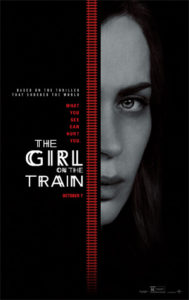 Starring: Emily Blunt, Rebecca Ferguson and Haley Bennett
Starring: Emily Blunt, Rebecca Ferguson and Haley Bennett
Directed By: Tate Taylor
Rated: R
Running Time: 112 minutes
Universal Pictures
Our Score: 3 out of 5 Stars
Something’s in the water in Westchester County, New York. Megan Hipwell (Bennett) refers to herself as the county whore to her psychologist (Edgar Ramirez), while flirting with him in over-the-top fashion. She’s cheating on her emotionally abusive husband, Scott Hipwell (Luke Evans), presumably with more men than just her psychologist. Her carefree and apathetic nature is used to mask her emotionally fragility. The Hipwell’s next door neighbors are dealing with turmoil of their own, but not within their own marriage. Anna Watson (Ferguson) and Tom Watson (Justin Theroux) are dealing with Tom’s ex-wife, Rachel (Blunt).
Rachel may just as be emotionally damaged as Megan. She takes the train to her non-existent job every day so she can glance at her ex-husband’s home for a brief second. Unknowingly, she also is glancing into the home life of Megan and Scott’s life. In her head, Rachel imagines a happier home than the one that actually exists. Everyone collides and connects in a disgruntled mess when Megan goes missing the same night Rachel goes on an epic bender involving a full fifth of vodka and hotel-sized bottles of other assorted liquors. Rachel begins to include herself in everyone’s lives even more while also being a prime suspect in the criminal investigation behind Megan’s disappearance.
“The Girl on the Train” will most likely be compared to 2014’s “Gone Girl” which is really unfair. “The Girl on the Train” isn’t as smart, witty, or amusingly dark as “Gone Girl”. “The Girl on the Train” is more like a contemporary reimagining of the late 80’s and early 90’s steamy murder skin flicks like “Fatal Attraction” or “Disclosure”. The comparison to “Gone Girl” may be because of the narrative for “The Girl on the Train,” which is very confusing at times. It jumps back and forth between the past and present so much that you begin to mistake who’s telling the story and which story has already happened and which one is still unfolding.
The time jumps are a method by the film to confuse the viewer about who’s responsible for Megan’s disappearance and, as anybody could easily guess, her death. The movie leaves a lot of red herrings, but the movie makes a fatal mistake by establishing from the get-go that when we see things through Rachel’s eyes, she’s an unreliable narrator, ultimately nixing any theories or ideas that come falling out of her brain or her blurred drunken visions.
“The Girl on the Train” is a two-hour version of “48 Hours” that intentionally jumbles up the “who-dun-it” portion of the story. But if you’re a keen observer, you’re going to ultimately guess what’s going on during Rachel’s alcohol fueled hallucinations, Megan’s flashbacks during her psychologist visits, Scott’s recollections and the unsettling calmness of Anna and Tom’s love life. By the time the big twist arrives, the movie isn’t quite sure how to proceed. It ends up over explaining how it all went down and tries to find some resemblance of meaning to end on.
“The Girl on the Train” is carried mainly behind some terrific performances, including Blunt who portrays a struggling alcoholic coping with horrific memories and a failed marriage. If the movie was more memorable, Blunt would surely be an early runner for a best actress Oscar. Bennett’s character, despite not being too relatable or sympathetic, is given meaning and passion through Bennett who once again, may have been in an early running for an Oscar if this movie was better. “The Girl on the Train” isn’t this year’s “Gone Girl” and won’t be a movie you’ll be talking about long after you leave the theater, but is interesting enough to sustain its near two-hour runtime. Folks who regularly watch Investigation Discovery will find plenty to enjoy here and others, like me, may find it’s brooding steaminess oddly charming, but ultimately flawed.

